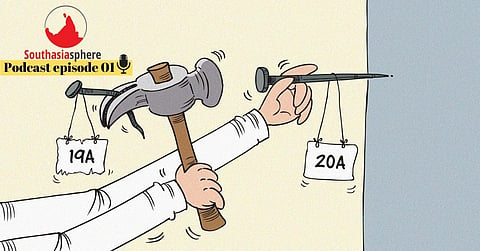Illustration by Gihan de Chickera.
Podcast
Elections in Sri Lanka, freedom of speech debates in India, war on drugs in Bangladesh and more
Southasiasphere: Podcast #01 - Updates and analysis from around the region.
Starting this month, we are happy to announce that Southasiasphere, our analysis of regional affairs will be a monthly podcast featuring Himal editors! If you're a member, you'll automatically receive links to the new episodes in your inbox. If you're not yet a member, you can still get it for free (for the time being..) by signing up here.
In this first audio episode of the roundup, we talk about elections in Sri Lanka, freedom of speech debates in India, war on drugs in Bangladesh and more.

